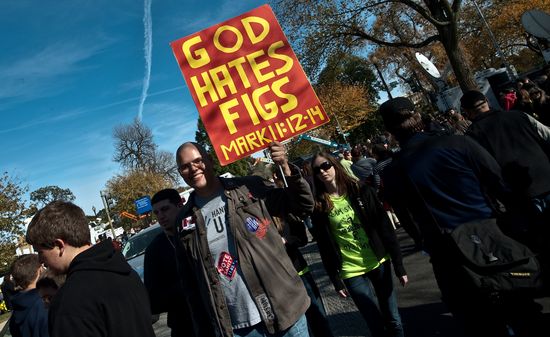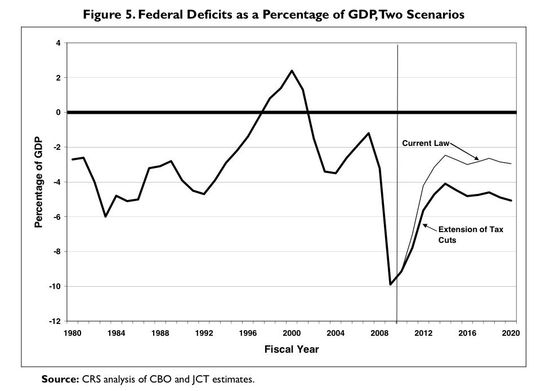
The Graph-O’-Lantern, by Stephen Von Worley, is "6% pie, 5% Venn, 13% bar, and 100% gourd."

The Graph-O’-Lantern, by Stephen Von Worley, is "6% pie, 5% Venn, 13% bar, and 100% gourd."
Some interesting and nuanced thoughts from Jeff Weintraub, from a few years' back.
A couple of words about my little series of posts Debating Israel-Palestine, here and here. I'm trying something new – a series of posts to lay out a complicated set of ideas and arguments. Apart from small fact-hecks or clarifications, I hope to put off a full debate on this until I'm done. Maybe that won't work within a blogazine's pace and dynamic. But to get to what I want to say requires a lot of qualification, specifics and developed argument. I hope to end the thing at four longish posts in total. So patience please until I'm done (with any luck given the elections, within the next week).

So it seems Keith Olbermann was unimpressed, which is a very good sign.
I've been trying to think of why yesterday was unlike almost any other rally I've ever been to.
One obvious observation: it was the first actual ironic rally I've attended. Most of those in this movement were clearly ambivalent about being in any movement, but at the same time seemed to be acting out of some shared civic duty. "One man can write a pun, but every man must try." Almost every poster and placard was ironic, or undercut the ego or seriousness of the protester. One of my truly in-joke favorites: "Personally, I Blame Matt Yglesias." Who cannot rally behind that?
There were very, very few explicitly partisan appeals or personal attacks on public figures; and if the  Beck rally coalesced around vague themes of patriotism, God and motherhood, this one seemed motivated by a simple sensibility of reason, empiricism and humor. But it was no less determined for that, in a quiet, midwestern, Frances-McDormand-In-Fargo kind of way. It was BobBo, but also Generation Obama; it was cool, but also unfashionable in a frumpy NPR-listener kind of way. It was the post-everything American middle class.
Beck rally coalesced around vague themes of patriotism, God and motherhood, this one seemed motivated by a simple sensibility of reason, empiricism and humor. But it was no less determined for that, in a quiet, midwestern, Frances-McDormand-In-Fargo kind of way. It was BobBo, but also Generation Obama; it was cool, but also unfashionable in a frumpy NPR-listener kind of way. It was the post-everything American middle class.
The point, it seemed to me, was that politics isn't all there is to life, there is something slightly off about those who think it is, and that political ideology has come to define us culturally and personally far too much. So this wasn't an angry rally for the alienated Democratic left; or even a joyous rally like last fall's March for Equality; or a desperate and frustrated rally like the Tea Partiers. No one was demanding their country back; they were just demanding, well asking, for a little less polarization, and a little more mutual understanding. It was an Obama rally that didn't want to be an Obama rally. And it was only an Obama rally sotto voce because he seems currently the only adult in Washington with any interest in compromising with anyone.
There are, after all, three political groupings in American politics Republicans, Democrats and Independents. But there are also three cultural groupings: ideologues, the pragmatists, and the totally indifferent. This was a rally for the pragmatists, which made it, for my money, the core Obama base.
It wasn't ethnically very diverse, but there were many more boomers than I expected. It was very good humored, and one sensed that the entire crowd loathed Fox, felt queasy about MSNBC, couldn't bring themselves to watch CNN and caught NPR in the commute. The young were out in force, but, again, they seemed like the Obama generation – not the facile dreamers who saw a Messiah in 2008, but the resilient rump who knew full well what he was up against.
Is this actually a politics?
Not if one compares it with, say the Perotistas of the early 1990s, or the Beckians of August (almost all of whom will surely be voting Republican on Tuesday because to do otherwise is the end of all American liberty for ever). But it is an identity politics: proud of being educated, sick of being stereotyped, interested in facts and reality, fed up with being condescended to … and deeeply worried about the direction in this country.
If the ghost of Richard Nixon will allow me, Stewart and Colbert have sensed a silent plurality, alienated by both parties, still hoping for Obama's success, and yet unwilling to worship any politician or even take themselves too seriously for fear of falling into the same foul-smelling bullshit that already covers far too much of our political culture.
And that gave me not just a great afternoon. It gave me hope.
(Photos: Nicholas Kamm and Win McNamee/Getty.)
Jonah Lehrer writes that Twitter encourages users to follow someone because they "share a set of common interests and beliefs," whereas Facebook "allows us to keep track of people we know in real life." He then applies to both sites the findings of a new paper:
What’s interesting is that the differences between Twitter and Facebook mirror a longstanding debate about how the human brain processes other people. Do we assess others based on similarity, on their devotion to the same political beliefs, TV shows and sports teams? Or do we focus instead on their closeness to us, on whether or not they’re a sibling or a third cousin or a distant friend? This might seem like a minor mystery, but it has some major implications for social cognition. Are we clannish creatures, obsessed with bloodlines and kinship? Or are we more interested in finding a group that shares our peculiar passions and opinions?
Facebook wins:
While similarity is nice – it makes cocktail conversation a little bit easier – it’s ultimately less important than mere familiarity. Of course, social cognition is an incredibly complex process, and can’t be neatly reduced to the blood flow of a single brain area. But this study helps us better understand why closeness matters, and why Facebook has more than 500 million active users, 50 percent of whom check their Facebook page every single day. We care about people we know, even if they vote for the other party.
Vulnerable Democrats are running away from Nancy Pelosi, as the above ad demonstrates. Weigel draws a lesson:
Democrats were skeptical, in 2006 and 2008, that Pelosi could become demonized as Newt Gingrich had become demonized. I think we're learning that with $1 billion of negative ads, you could demonize peanut butter sandwiches.
Not if sandwiches strike first.
Not exactly presidential language there from former half-first-term governor Palin, about a local CBS afffiliate's view of her preferred Senate candidate in Alaska. And reading the transcript and listening to the tape (see below) and reading the TV station's rather opaque defense/explanation, I'm not entirely sure what went on. Here's the tape of the end of a voicemail message for a Joe Miller campaign worker – left accidentally by not hanging up after the end of a real message:
But what it appears to me to be is a bunch of reporters, er, joking about various gambits to make a Joe Miller rally more page-view worthy. I don't think honestly that a local journalist is seriously going to go through a Miller rally looking for the lone "child-molester" on his staff or fabricating some violent shenanigans and then issuing a fake Twitter news alert "Joe Miller punched in face," when he obviously wasn't. Aren't they goofing around – hence all the laughter?
Maybe I'm wrong. But maybe it was too much for the affiliate to admit that their journalists take their jobs even more cynically than the rest of us watching them. Of course they're biased. But also getting loopy.

Here's what it would mean (PDF):
A recent study by Alan Auerbach and William Gale projects that tax revenue would have to be permanently increased by 4.6% of GDP just to keep the debt-to-GDP ratio at the current level over the next 75 years under the current law scenario (i.e., allow the Bush tax cuts to expire). They refer to this as a fiscal gap of 4.6%.
If the Bush tax cuts were permanently extended the estimated fiscal gap rises to 7.2%. They project that by 2085, debt as a percentage of GDP would approach 600% under the current law scenario and 900% if the Bush tax cuts are extended—extraordinary levels that are unprecedented for the U.S.
Current GOP policy – no tax increases, no entitlement cuts, no defense cuts – means turning a long-term fiscal emergency into a catastrophe.
There's a decent case for putting off the immediate sunsetting of the Bush tax cuts solely on the condition that it may help the economy recover in the short term and allow time to debate and enact systemic tax reform and big future entitlement and defense cuts. But that's a purely short-term option – and, in any case, political fantasy. Long-term, there is simply no credible, responsible fiscal case for preventing any sunsetting, especially for those earning over $250,000, unless you want to gut Medicare, defense and significantly re-jigger social security. The GOP has shown no signs before this election of being serious about any of these things, in fact, they are actively using the Medicare cuts in the health reform bill against Democrats. The Democrats, in turn, may resist any real entitlement cuts long-term. We'll see.
But the only hope I can see is Obama. And perhaps some sane Republicans and moderate Democrats who have somewhere been hiding out in the woods, and are the likeliest to be wiped out on Tuesday.

David Galbraith guesstimates that Lady Gaga "has cost Google 10 petabytes in bandwidth [- the] same as 10,000 text messages for everyone on earth," which would cost up to 10.5 trillion dollars, using AT&T rates. Kottke takes it one step further:
The rate for SMS messaging is obscene but the real money is in ink cartridges, right?
Apparently not. HP's basic black inkjet cartridge is available at Amazon for the astounding price of $29 and will print 495 pages. Assuming 250 words per page and six characters per word (five char/word + one space), 10 petabytes of text messages would cost only $503 billion to print out (excluding paper costs, which would add ~$89 billion to the total).
Who knew that texting was more expensive than inkjet printing by a factor of 20?
(Photo: Chris Polk/Getty.)
Robert Fair makes his usual calculation:
The current forecast (dated October 29, 2010) of the Democratic share of the two-party House vote is 49.22 percent. This has changed only slightly since last October. The equation has always predicted a close election. The current forecast is based on actual (preliminary) economic values, values that were released by the BEA on October 29, 2010. INFLATIONCC is 0.97 percent, and GOODNEWSCC is 1. The low inflation is good for the Democratic party, but the fact that there is only one good news quarter is not. On net, the Democrats are predicted to get slightly less than half of the two-party vote, 49.22 percent. This is down from 53.4 percent in 2008 for the on-term House vote.
I do not have an equation that translates the vote share into House seats, and so I have no prediction of House seats.
Bartlett argues that the result is basically pre-ordained by economic factors. Certainly, it would appear that what's about to happen seems mightily similar to 1982 and 1994 – or indeed almost any first presidential term mid-term since 1862, when the president's party takes a hit. (2002 is a strange one because of the proximity to 9/11).
Aaron Carroll amasses the evidence:
We cannot definitively prove that no child has ever been killed by a stranger poisoning their Halloween candy, but we can state that no such event has been documented in the media to the best of our knowledge.
Of note, children do face some real health risks on Halloween, but the risks come from cars, not candy. The National Safety Council reports that children are at an increased risk of injury as pedestrians, being four times more likely to be killed by a car while walking around on Halloween than on any other night of the year. So, if you really want to keep your kids safe, focus on making sure they are visible to cars and are very careful about crossing the street, particularly as darkness falls.